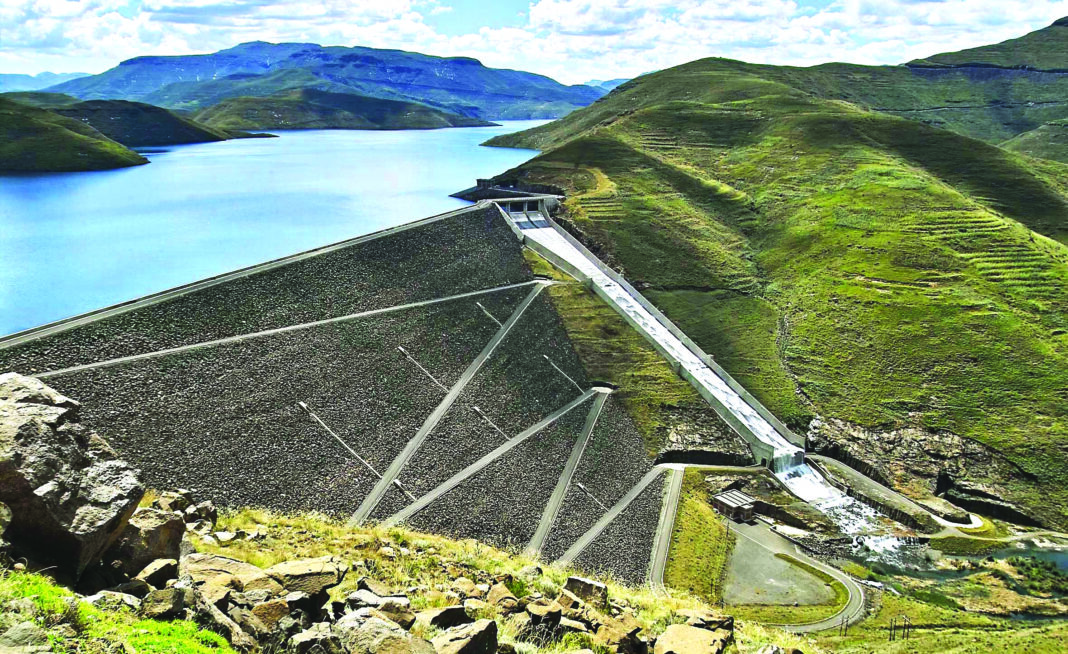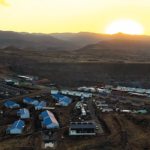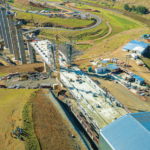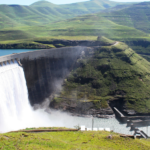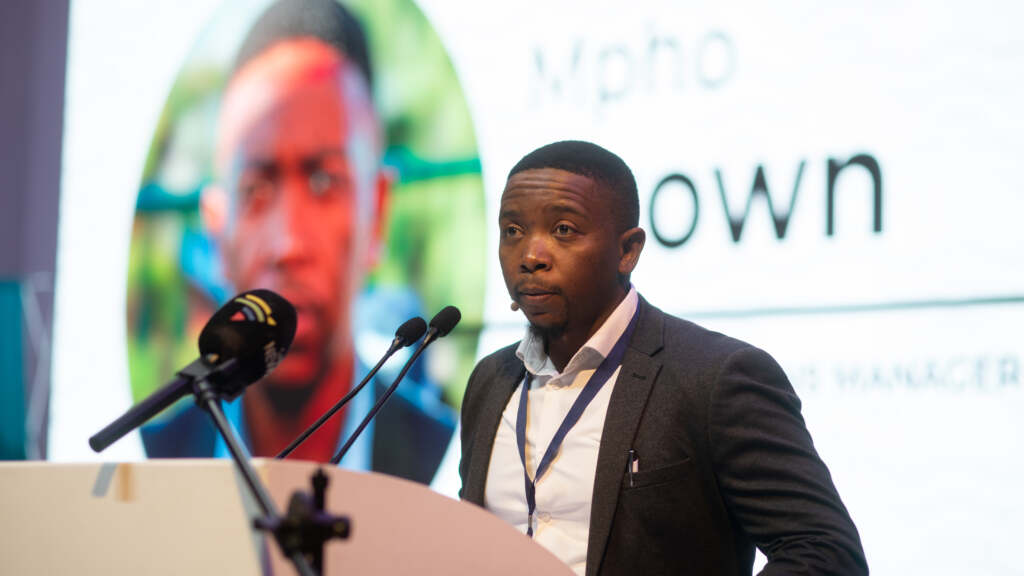Chris Mokolatsie
The Sesotho expression “monga khomo o ja lefureng” speaks to the expectation that ownership brings rewards. Yet, for many Basotho, this truism in the benefits promised by Metsi a Lihlaba as the Lesotho Highlands Water Project (LHWP) is colloquially called has become an elusive dream and manna from heaven that never comes. Instead of delivering prosperity (nala) as the motto of the nation says the project has created a glaring resource curse, particularly for villagers displaced by the construction of massive dams like Katse, Mohale, and now Polihali.
For some, the project is a missed opportunity to unlock abundant provision of clean drinking water for every Mosotho especially in urban areas, a labyrinth of canals for irrigation for every tśimo, subsidised electricity for every mokhoro and mokhúkhú, not to mention local economic development of thriving trout fishing and booming leisure tourism of boat cruises.
One can imagine these sailing up and down the Malibamatśo River from Katse Dam wall all the way up to Mphorosane, giving tourists and locals unparalleled experience of the beauty of these man-made wonders.
For many villagers and communities in the affected areas, these remain a pipe dream, for the project has brought only displacement, loss of livelihoods, and broken promises. The plight of these communities underscores the failure of this project as a whole. It was supposed to uplift the nation but has instead deepened poverty for many households in the areas affected.
Unfulfilled Promises and Lost Livelihoods
Recently there have been a series of protests around Phase II of this project, particularly the construction of Polihali Dam. Protests in Mokhotlong by residents and community associations from Malingoaneng and Tlokoeng have drawn fresh attention to the unresolved struggles surrounding the LHWP. These demonstrations reveal the villagers’ dissatisfaction with unjust compensation, loss of subsistence farming and grazing land, and lack of meaningful consultation. Villagers view the project as a stark example of resource extraction that benefits local elites with political connections, and foreign companies, including Chinese contractors, while sidelining local communities, especially villagers in the areas affected by the project. Employment opportunities for those most affected have failed to materialise, and promises of economic prosperity have evaporated.
Instead, the LHWP has become a modern-day “resource curse,” where natural resource wealth exacerbates the plight of already marginalised communities.
The arrogant unaccountable approach of the Lesotho Highlands Development Authority (LHDA), the project’s implementing body, through this project phases has also made matters worse. Instead of treating villages as legitimate stakeholders whose concerns at least be listened to, LHDA has adopted a very belligerent stance consistently refusing to engage meaningfully with affected communities to address their concerns. In the case of Polihali, protesters have been met with indifference, and outright disdain by LHDA officials including the project manager Gerard Mokone, who refused to meet with the protesters.
Repeated meetings with Prime Minister Matekane by these protesters have at best been a waste of time that yielded no tangible results. This lack of responsiveness by both the Prime Minster and LHDA to these communal concerns reflects a deeper issue: a government determined to prioritise the project at all costs while neglecting the very people on whose land this project is being built.
For many Basotho, the promises of job creation, infrastructure development, and increased revenue have remained unfulfilled. Instead, the project has brought displacement and the destruction of livelihoods. Villages like Bokong in Thaba-Tseka and now Polihali in Mokhotlong will witness the flooding of farmlands and grazing pastures, which had sustained their communities for generations.
Relocated villagers often find themselves in settlements with few economic opportunities. Former farmers and herders, stripped of their ancestral lands, are left with no means of subsistence. Despite assurances of compensation and development, the reality has been one of deepening poverty and frustration. The absence of meaningful local benefits starkly highlights the inequalities created by the project.
Historical Injustice: Revisiting the Original Treaty
When completed, Lesotho will have three massive reservoirs: Katse, Mohale, and Polihali. While these reservoirs are vital for South Africa’s water supply, they offer little direct benefit to local communities. However, with visionary leadership, they could be repurposed to drive local economic growth. Tourism, for instance, presents a significant untapped opportunity including recreational activities like boat cruises, fishing, and leisure tourism, all of which could create jobs and stimulate local economies, while offering sustainable livelihoods for affected villagers through employment and other business opportunities.
These massive water resources, while vital for supplying South Africa with water, as envisioned in the current treaty, have no direct ongoing benefit to the communities living nearby. However, there is potential to repurpose these reservoirs for local economic development, with specific reference to tourism. Investing in tourism infrastructure would generate employment while promoting Lesotho as a regional tourist destination. This shift in focus would ensure that the reservoirs become more than mere water tanks for South Africa, they could serve as catalysts for local development.
In the current treaty, the tourism potential of these sites has largely been ignored, and yet there is a real opportunity for sustainable economic growth if the dams are leveraged for leisure activities such as boat cruises, fishing, and recreational tourism. Lesotho’s renowned trout fishing industry could be expanded around these reservoirs, creating jobs and economic opportunities for local communities.
Leisure cruises and charter boats on these reservoirs could become a major draw for both local and international tourists, offering villagers in areas like Mokhotlong and Thaba-Tseka new sources of employment. These types of initiatives would not only provide jobs for the communities in the long term but would also stimulate the local economy by encouraging investment in infrastructure, hospitality, and related industries locally. This is an opportunity for the government to think beyond water as just a resource for export to South Africa and to consider how it can generate long-term, sustainable economic activity for local people, by exploiting the spins of the “mining of the white gold”.
As Lesotho continues its journey with the LHWP, it must address these systemic issues to prevent further harm to communities in the affected areas and ensure that the project becomes a source of shared prosperity for the nation but more importantly where local villagers and communities can feel the tangible benefits at a personal level, not just another chapter in the country’s tale of unfulfilled potential.
The roots of general discontent with Metsi a Lihlaba among many Basotho not just the residents of Polihali and surrounding villagers of Mokhotlong, trace back to the ill-conceived wretched treaty signed under duress in the 1980s by the military junta of Major General Metsing Lekhanya. Negotiated under the threat of Pretoria sanctions and blockades the agreement prioritised South Africa’s water needs while offering little to Lesotho, especially to ordinary citizens. This explains former Lesotho Prime Minister Leabua Jonathan’s decades-long refusal to sanction this project.
This flawed treaty has long been seen as a form of economic subjugation. Today, there is an urgent need to renegotiate its terms to ensure that Lesotho genuinely benefits from its natural resources. The government of Prime Minister Matekane must leverage the next bilateral engagement with South African President Cyril Ramaphosa to demand a fairer deal and renegotiate a better treaty that recognises greater benefits for Basotho.
Such renegotiation would not only correct historical injustices but also pave the way for sustainable local economic development at places like Polihali that will last for years long after project construction is completed, and local communities can indeed enjoy the privileges of the status of “monga khomo o ja lefureng”.
Summary
- Instead of delivering prosperity (nala) as the motto of the nation says the project has created a glaring resource curse, particularly for villagers displaced by the construction of massive dams like Katse, Mohale, and now Polihali.
- For some, the project is a missed opportunity to unlock abundant provision of clean drinking water for every Mosotho especially in urban areas, a labyrinth of canals for irrigation for every tśimo, subsidised electricity for every mokhoro and mokhúkhú, not to mention local economic development of thriving trout fishing and booming leisure tourism of boat cruises.
- Villagers view the project as a stark example of resource extraction that benefits local elites with political connections, and foreign companies, including Chinese contractors, while sidelining local communities, especially villagers in the areas affected by the project.

Your Trusted Source for News and Insights in Lesotho!
At Newsday Media, we are passionate about delivering accurate, timely, and engaging news and multimedia content to our diverse audience. Founded with the vision of revolutionizing the media landscape in Lesotho, we have grown into a leading hybrid media company that blends traditional journalism with innovative digital platforms.


